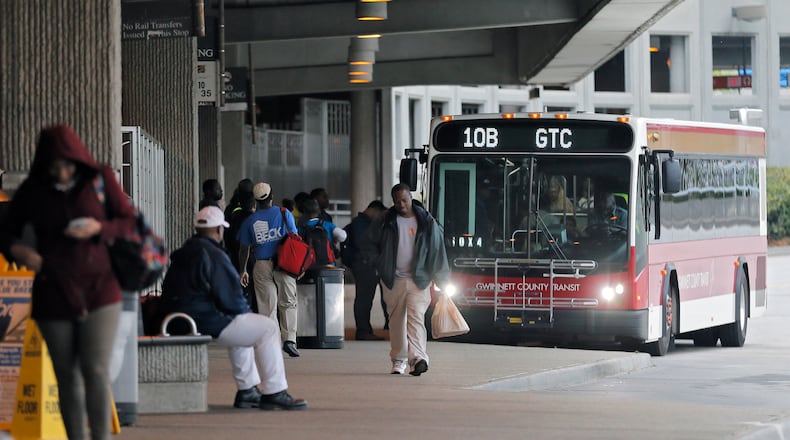Perhaps the biggest indicator of Gwinnett County’s readiness to consider expanding its transit options is the increasing willingness of its leaders to advocate for it without fear of political repercussions.
In her 2016 state of the county address, Commission Chairman Charlotte Nash noted Gwinnett's growing need for more transit options, flashing images of new-age buses and other possibilities on the screen that loomed over hundreds of local dignitaries.In her 2017 state of the county address, Nash openly advocated for her county to have a vote on transit expansion — soon.
And in her 2018 state of the county address, delivered Wednesday at Duluth’s Infinite Energy Center, Nash called expanding transit “significantly” the county’s “next big decision.”
“Even 20 years ago, I knew that at some point our population growth would dictate that we would get to that point,” Nash said after her speech in front of hundreds of community leaders. “At that time I didn’t visualize me being the one getting up to talk about it because I never thought I would run for office. But it’s not a surprise that we’re at the point where that’s a big part of our conversation about what we have to do now.”
Nash's annual address — which also touched on the county's ongoing bicentennial celebrations, its plans for a world-class water research facility and various transportation projects — came less than 24 hours after she visited the Georgia State Capitol to show her support for a new transit bill introduced by House Speaker David Ralston.
That bill, as well as similar legislation filed by the Senate, would allow 13 counties in metro Atlanta to ask their voters to approve a 1-cent, transit-funding sales tax for up to 30 years. That's something Nash has advocated for but, as currently written, HB 930 also could complicate Gwinnett's quest to have such a referendum this November.
The proposed legislation would mandate that any local transit-funding referendums include a specific list of projects approved by a new regional planning board — a body which wouldn’t be officially formed until Jan. 1, 2019, nearly two months after Gwinnett’s proposed vote.
If that vote doesn’t happen during this fall’s general election, which includes a gubernatorial race, it would likely be postponed another two years (until the 2020 presidential election) to ensure maximum turnout.
The prepared text of Nash’s Wednesday speech said her goal was to “present a viable transit approach to voters, perhaps as soon as this November.”
During her actual address, she replaced the latter with “just as soon as we are able to do so.”
Wayne Mason, famed Gwinnett County dealmaker and a former commission chairman, bragged Wednesday about hiring Nash as a county grant writer straight out of college. He said, too, that he thought Gwinnett was ready for more transit.
“If they get it on the ballot it’ll pass,” he said.
MYAJC.COM: REAL JOURNALISM. REAL LOCAL IMPACT.
The AJC's Tyler Estep keeps you updated on the latest happenings in Gwinnett County government and politics. You'll find more on myAJC.com, including these stories:
Never miss a minute of what's happening in Gwinnett politics. Subscribe to myAJC.com.
About the Author
Keep Reading
The Latest
Featured




